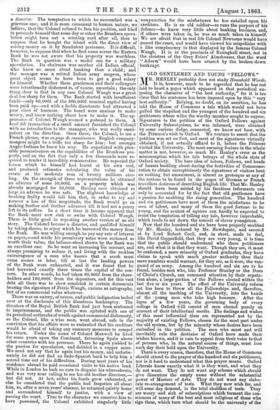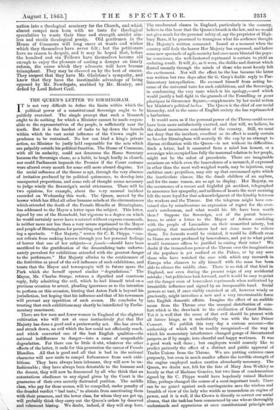OLD GENTLEMEN AND YOUNG "FELLOWS."
MR. HENLEY probably does not study Household Words. It is, however, much to be regretted that he has not laid to heart a paper which appeared in that periodical ex- posing the character of "the best authority," for it is too clear that his acuteness has been imposed upon by this "very best authority." Relying, no doubt, on its assertion, he has told the House of Commons a tale which would not have gulled the stupidest and the youngest of the hundred and six petitioners whose wiles the worthy member sought to expose. Signatures to the petition of the Oxford Fellows against University Subscriptions, he was informed, were obtained by some curious dodge, connected, we know not how, with the Princess's visit to Oxford. We venture to assert that the petition was set on foot, and most of the signatures virtually obtained, if not actually affixed to it, before the Princess visited the University. The moat amusing feature in the whole matter is not, however, so much Mr. Henley's error as the misconception which his tale betrays of the whole state of Oxford society. The bare idea of tutors, Fellows, and heads of houses bustling about during the festivities of Commemo- ration to obtain surreptitiously the signatures of visitors bent on nothing but amusement, is almost as grotesque as any of the notions to be found in the pages of German or French travellers desirous of describing English life. That Mr. Henley should have been misled by his facetious informants can only be accounted for by the fact that old gentlemen have a passion for snubbing the rising generation. The hundred and six petitioners have most of them the misfortune to be men of talent, and many of them the good fortune to be young, and the acutest of squires can hardly be expected to resist the temptation of telling any tale, however improbable, which tends to set down the conceit of clever youngsters.
Now that the hundred and six have been properly snubbed by Mr. Henley, lectured by Mr. Newdegate, and sneered at by Lord Robert Cecil, and, in short, made to feel, like David Copperfield, that they are very young, it is time that the public should understand who these petitioners are, and what it is that they want. Though they are, it must be confessed, a mere minority of Oxford graduates, they have claims to speak with much greater authority than their mere numbers would warrant, for they are, as it were, the van- guard of an army. Among the hundred and six are to be found, besides men who, like Professor Stanley or the Dean of Christ's Church, can command attention by their reputa- tion alone, a large portion of the Fellows elected within the last five or six years. The effect of the University reform act has been to throw all the Fellowships and, therefore, almost all the teaching of the University, into the hands of the young men who take high honours. After the lapse of a few years, the governing body of every college in Oxford will consist of men elected purely on account of their intellectual merits. The feelings and wishes of this most influential class are represented not by the majority of existing Fellows, chosen for the most part under the old system, but by the minority whose desires have been embodied in the petition. The men who must and will inevitably rule the destinies of Oxford have made their wishes known, and it is vain to appeal from their voice to that of persons who, in the natural course of things, must lose each day their hold upon the University. There is every reason, therefore, that the Howe of ComMons should attend to the prayer of the hundred and six petitioners, nor is it hard to understand what this prayer means. Oxford Liberals know exactly what it is they want, and what they do not want. They do not want any scheme which should give dissenters the empty name without the substantial power of Masters of Arts. They do not want any elabo- rate re-arrangement of tests. What they now wish for, and will some day demand, is the total abolition of tests. They are weary and sick of subscriptions which torment the con- sciences of many of the best and most religions of those who sign them, which turn what should be the university of the nation into a theological seminary for the Church, and which almost compel men born with no taste for theological speculation to waste their time and strength amidst aim- less and sterile theological gossip. Old gentlemen in the House of Commons will long sneer at wants and wishes which they themselves have never felt ; but the petitioners have no reason to despair, and it may be hoped that, before the hundred and six :Fellows have themselves become old enough to enjoy the pleasure of casting a damper on timely reform, the cause which they advocate will have become triumphant. They may be cheered on by the best of omens. They suspect that they have Mr. Gladstone's sympathy, and know that they have the inestimable advantage of being opposed by Mr. Newdeg,ate, snubbed by Mr. Henley, and defied by Lord Robert Cecil.































 Previous page
Previous page